This summer, the PhD students of Renmin University of China (RUC), in groups, carried out researches based on the needs and practical problems of 28 districts and counties across China.
A total of 165 PhD students and teachers were divided into 14 groups to conduct researches in 11 cities in 9 provinces and visited more than 240 places. They have completed 14 high-quality research reports and providing social services for farmers.
Focusing on industrial development and exploring ways to thrive
1. Nanping industry group, Fujian Province
In Nanping City, Fujian Province, focusing on “Bamboo industry development and ecological construction”, 11 members of the group visited 4 districts, 12 towns and 26 places, investigating enterprises such as Qiankeng Forest Farm, Jinying Tea Enterprise and Pinjia Bamboo Products Corporation. The group discussed with the local officers and business leaders to learn how the bamboo products promote the development of the local economy.

Li Tian, a PhD student of the School of Applied Economics, said, “After the in-depth visit and research, we felt the huge potential of the bamboo industry and the profound heritage of tea culture, and also saw a new path of green and high-quality development.”
2. Fuzhou science group, Fujian Province
In Fuzhou City, Fujian Province, focusing on “Difficulties and Breakthroughs of Fuzhou’s Science and Innovation”, 10 members of the group visited 5 districts, 6 towns and 10 places to have a deep understanding of the development layout of science and innovation in Fuzhou. The members had a discussion with directors of the factories and enterprises on talent introduction, development positioning, school-enterprise linkage and other issues, and put forward constructive opinions.
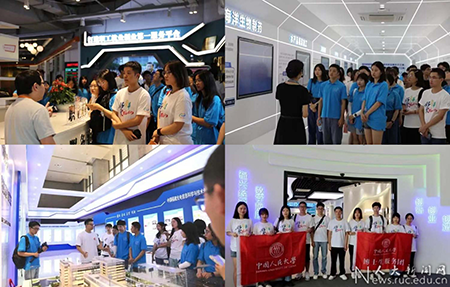
Huang Ziling, master of the School of Foreign Languages, said, “Science and technology is the primary productive force. Talent is the primary resource. Innovation is the primary driving force. Only by vigorously promoting the scientific and technological innovation can we have a high-quality development.”
3. Fuzhou industry group, Fujian Province
In Yongtai County, Fuzhou City, Focusing on “Exploring the optimization path of Yongtai Green development”, 11 members of the group visited 4 towns and 7 places. They have chatted with relevant persons, which helped them understand more comprehensively about the situation of Yongtai.

Wei Shijie, a PhD student of the School of Science, said, “In the visit of Yongtai County, we felt the full determination in the development of green industry, and witnessed a number of measures it took to optimize the industrial structure.”
4. Zigong group, Sichuan Province
In Zigong City, focusing on “Exploring clusterization of emerging industries”, 13 members of the group visited 7 towns and 22 places to conduct discussions on fields including new materials, new energy, unmanned aerial vehicles and general aviation industries.
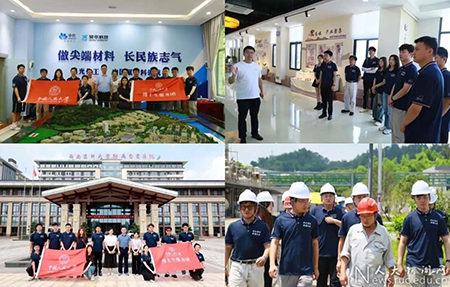
Wang Yanan, a PhD student of the School of Environment, said, “Through this research, I have a deep understanding of the local history, culture as well as the social and economic conditions of Zigong. In the future, I will integrate my professional knowledge with the findings of this research to produce high-quality academic achievements so that to serve the local development.”
Focusing on the reality and contributing to rural revitalization
1. Nanping ecology group, Fujian Province
In Nanping City, focusing on “Nanping Green Industry Development”, 9 members of the group visited 8 towns and 26 places, talking with village secretaries and enterprise leaders about cultural tourism development, scientific and technological innovation, industrial revitalization, and rural governance. They also put forward suggestions and cooperated with the villages to carry out activities to promote the local agriculture.
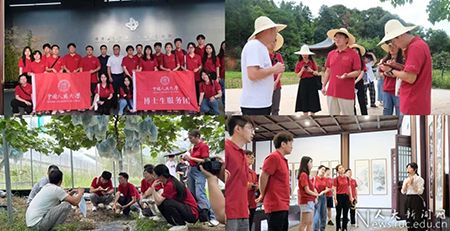
Zhang Zhongyuan, a PhD student of the School of Economics, said, “We have seen Nanping’s courage to explore the ecological path and the wisdom to layout the bamboo industry. Only by adhering to the industrial development and promoting the ecological protection, can rural revitalization truly be realized."
2. Ganzhou group, Jiangxi Province
In Huichang County, focusing on “digital economy and industrial transformation", 9 members of the group visited 7 towns and 16 places. They exchanged views with the officers on fields such as digital infrastructure construction. They also provided their own advice on the development problems facing Huichang County.
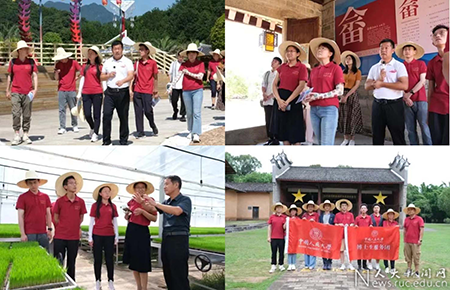
Zhuang Lin, a PhD student of the School of Finance, said, “We visited a number of towns and villages to understand the digital development of Huichang County's characteristic industries and outstanding results of rural revitalization. ”
3. Jiaxing group, Zhejiang Province
In Tongxiang, focusing on “Digital Village Construction”, 10 members of the group visited 8 towns and 20 places, and exchanged views with officers and business leaders on the development of digital economy, the sustainability of digital village construction, innovation and entrepreneurship policies, talent introduction and other issues.
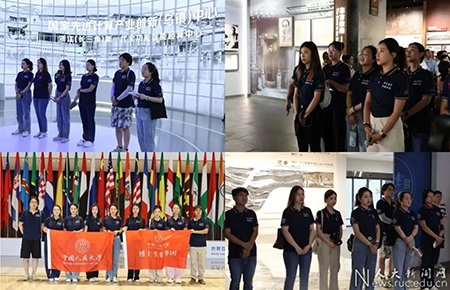
Sun Jialong, a PhD student of the School of Mathematics, said, “In Tongxiang, the digital economy helps build a ‘new engine’ of high-quality development of the agriculture. ”
4. Heze group, Shandong Province
In Heze City, focusing on “Exploring the path of rural revitalization by the talent industry”, 12 members of the group visited 3 counties, 6 towns and 32 places. They investigated the development of the peony, Chinese traditional clothes, vegetables and e-commerce industries, as well as the talent promotion work in the rural revitalization.

Xu Ling Jingyuan, a PhD student from the Business School, said, “As a doctor majoring in business management, I will further exert my professional strengths in the future research, accumulating the experience of the construction of agricultural production service supply chain in Heze City, and contribute more to the cause of rural revitalization."
Learning the characteristics of different nationalities and exploring diversified development
1. Zhaoqing group, Guangdong Province
In Xiashuai Town, focusing on “promoting the integration of agriculture, culture and tourism with national characteristics”, 12 members of the group visited 15 places to explore the integration and development mechanism of cultural, natural and industrial resources. They also had a discussion with relative officers and leaders on brand construction, cultural inheritance and structure optimization, etc.

Chen Xing, a PhD student from the School of History, said, “I was deeply impressed by hospitable people of all ethnic groups, the colorful rural culture, and the vibrant economy of Xiashuai Town. By this research, I also better understand the living conditions of officers and residents.”
2. Hami Group, Xinjiang Uygur Autonomous Region
In Hami, focusing on “Exploring the experience and countermeasures of the protection of intangible cultural heritage under the background of ethnic integration”, 12 members of the group visited 3 districts, 3 towns and 17 places, where they had discussions with the officers, inheritor of intangible cultural heritage and local villagers. They summed up the experience of ethnic unity and the promotion of the intangible heritage in Hami City, which helped to find the development mechanism of minority culture in the future.

Wei Yifan, a PhD student of School of International Relations, said, “In this research, we saw the efforts of the local people of all ethnic groups in maintaining ethnic unity, border stability and developing the local economy, which provides a new direction for our future research activities."
3. Dali group, Yunnan Province
In Nanjian County, focusing on “Accelerating new urbanization construction in county”, 12 members of the group visited 4 towns and 21 places to understand the economic development achievements of Nanjian County in detail. They also thought about the internal links between new urbanization and Chinese path to modernization.
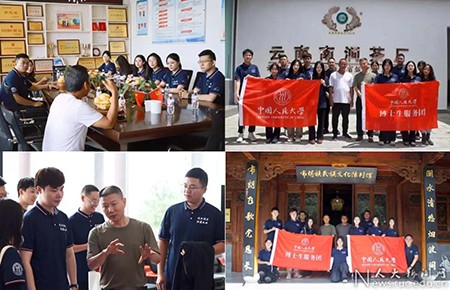
Song Xuran, a master of the School of Literal Arts, said, “We learned that in recent years, guided by the new urbanization, Nanjian County has struggled to pave a road of its own green development. As young students, we should shoulder the burden of the times and devote ourselves to the new urbanization construction.”
Walking into basic units and understanding the development of the towns
1. Xiamen group, Fujian Province
In Xinwei Town, focusing on “Modern governance of urban villages”, 14 members of the group visited 8 towns and 5 places to view the improvements of Xinwei Town village appearance and the development of rural industries. They held a symposium with the relative responsible officers and corporation leaders, put forward opinions on project planning, investment promotion and industrial integration.
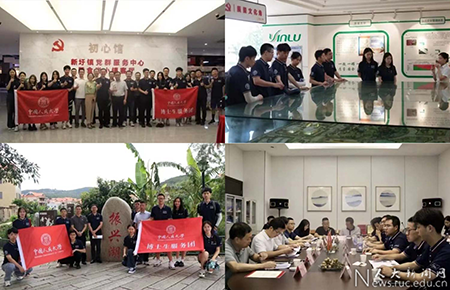
Chen Kaiyi, a master of the School of Foreign Languages, said, “I followed the team to explore the path of modern governance of urban villages in Xinwei Town, which gives me an opportunity to witness the blueprint of rural revitalization. In the future, I will practice more and write my essays from practice.”
2. Shenyang group, Liaoning Province
In Shenyang City, focusing on the “Practice and Dilemma of Youth Development oriented City”, 8 members of the group visited 5 districts, 12 streets and 10 places to understand the construction model, innovative measures and practical difficulties of Shenyang. They also discussed with the government officers and corporation representatives about the policy design and safeguard measures of Shenyang to be a Youth Development Oriented City.
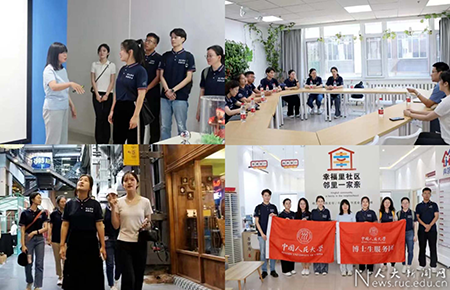
Chen Yun, a PhD student of the School of Applied Economics, said, “Young people should put their personal development into urban development, and strive to be pioneers in the high-quality development of the city.”
3. Fuzhou culture group, Fujian Province
In Fuzhou, focusing on the “Digitalization of Min Culture” (Min is short for Fujian Province), 11 members of the group visited 14 places such as Fuzhou Software Park and Yishan Cultural and Creative Park to view Fuzhou’s practice of “digital China” and to sum up its experience. They also provide suggestions for further improving the digital infrastructure and enhancing the digitization of cultural resources and public services.
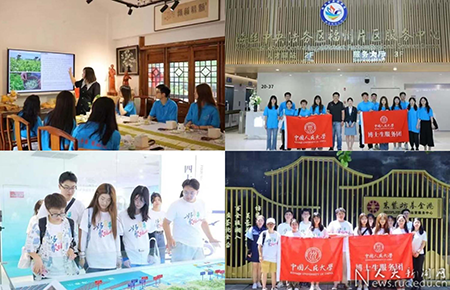
He Chaoyi, master of School of Marxism Studies, said, “How to inject digital vitality into the ancient city with a long cultural background is the issue of the times."
This summer, the doctoral student group conducted in-depth researches on the major and difficult issues faced by local governments, including party building, economic development, and social governance. They offered suggestions for local industry revitalization, talent introduction and science and innovation. In the future, this project will continue to explore the path to modernization, and try to solve the problems with professional knowledge and concern for the people.
The RUC Doctoral Student Group was founded in 2007. In the past 16 years, the project has sent more than 600 teachers and students from 26 colleges to participate in social practice, covering nearly 50,000 kilometers. The research reports written by the students on the topics of high-quality industrial development, ecological environmental protection, rural revitalization and urban-rural integration have been published on many authoritative journals and medias.



